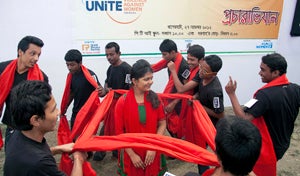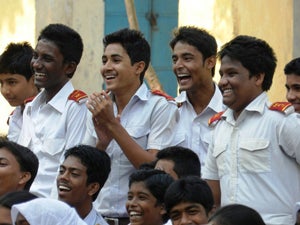Bringing drama into the streets in Bangladesh
Date:
Dhaka, 26 March 2013: “ Violence puts women behind and creates a situation that does not allow women to use their full potential,” said a woman, sitting in an airy, green park, after watching a gripping interactive theatrical performance on violence against women in Khulna, Southern Bangladesh in November last year. “The ultimate loser is society.”

Together with UN Women Bangladesh, the organizations trained the young people on age-old an popular street theatre techniques and facilitated in-depth discussions about the prevalence and forms of violence against women that occur in Bangladesh. The groups each then chose a theme related to gender violence that they identified with and developed it into a short dramatic piece for members of their own communities. The goal: to engage more young people in programmes to eliminate violence against women and to change the mindset that such violence is a private or “personal matter” but rather a societal problem.
The performances were originally designed to be conventional plays, but then evolved into interactive dramas. After the actors would perform a story representing acts of gender violence, the entire cast would start engaging the audience in a conversation about the events that took place on stage, as well as the acts of violence that regularly take place in the community. The audience is asked: What went wrong here? What would you have done differently? What should have been done? What actions are not acceptable for the peace and progress of society?

Reacting to one performance in the city of Satkhira in southern Bangladesh, a male audience member felt violence against women affects the entire community: “It is not that men are always in privileged situations; they are also victims of violence against women when they are the father or brother of a woman. It’s important for men to prevent violence against women for their own sake.”
The theatre programme tries to bring a shift in attitude that an act of violence against a woman is not only an attack on a woman, but rather as an attack on the entire community in the eight communities it has reached, through urging the audience that they personally have a role to play in preventing violence against women.
During the process of performing their plays and interacting with the audience, the audience and the performers alike actively discover and process the impact of violence against women on society. As a result, the programme is cultivating new agents of change by enlightening and empowering youth to identify and eliminate violence against women. They learn that despite their age, they can play a key role by raising awareness and catalyzing change in their communities, beginning to shift the cultural norms that enable violence against women.

The programme in Bangladesh represents one of many creative outreach initiatives designed to engage communities within the Asia-Pacific Region. Other similar projects under the UNiTE campaign include the creation of a music video in the Philippines, a talk show in Indonesia, an art contest in Viet Nam, and a photo contest in India.